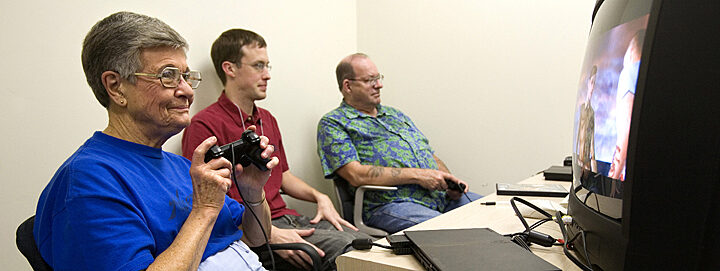UF researchers to test whether video games improve seniors’ mental functioning

Under the watchful eye of a University of Florida undergraduate research assistant, older adults practice playing video games in a pilot study of the effects of the games on seniors’ mental functioning. The new UF research, led by Patricia Belchior, Ph.D., builds on the previous study by increasing participants’ hours of play, moving the games to the home setting, and including more outcome measures, such as the transfer of mental gains to everyday tasks. (Photo by Sarah Kiewel/University of Florida)
Move over, kids. You might need to make room on that couch for grandma and grandpa, as seniors gear up to join the video game craze.
University of Florida researchers have received a $100,000 grant from the Robert Wood Johnson Foundation to explore whether interactive digital games can be used to enhance the mental abilities of older adults. UF joins 11 other research teams supported in this first round of funding from Health Games Research, an RWJF national program established to strengthen the evidence base related to the development and use of games to achieve desirable health outcomes.
Scientists in UF’s College of Public Health and Health Professions will study off-the-shelf video games to see whether older adults who play them can improve their mental functioning. The study will examine the effects of a popular action-adventure driving game on older adults’ ability to process visual information. While there has been a growing body of studies examining the positive effects of video games, the UF study is innovative because of its focus on the mental benefits of games, and because the target population is seniors, said Patrícia Belchior, Ph.D., the study’s lead investigator.
“This study is based on pilot work we have conducted, as well as the work of others, that has shown that playing action video games, even for as little as 10 hours in total, can significantly improve visual attention and provide positive mental benefits for adults aged 65 and older,” said Belchior, a postdoctoral fellow in the department of occupational therapy.
The UF research team also includes co-principal investigator Michael Marsiske, Ph.D., an associate professor in the department of clinical and health psychology, and co-investigator William Mann, Ph.D., a professor and chairman of occupational therapy.
The UF study represents one “next step” in work designed to find ways to maintain and improve mental function in later life, Marsiske said.
“There have now been several decades of positive findings regarding cognitive training in later life,” he said. “Our laboratory-based training studies have shown large improvements for older adults, with positive effects lasting as long as five years. However, we have often been unable to answer seniors’ questions about what they can do at home, to initiate their own mental exercise programs.”
With this study, the UF team hopes to evaluate whether home-based video games might be one mental exercise strategy that could benefit older adults. The study will track changes in video game play skill among players, and will investigate whether extended game play leads to improvement in visual attention and functional activities of daily life, including simulated driving.
Health Games Research is headquartered at the University of California, Santa Barbara. The program is directed by Debra Lieberman, Ph.D., a communication researcher in the university’s Institute for Social, Behavioral and Economic Research; a lecturer in the department of communication; and a leading expert in the research and design of interactive media for learning and health behavior change. Health Games Research is funded by an $8.25 million grant from RWJF’s Pioneer Portfolio, which supports innovative projects that may lead to breakthrough improvements in the future of health and health care.
“This groundbreaking study led by the University of Florida will identify new interactive behavioral health strategies to use in the design of future health games and technologies,” Lieberman said. “Together, the 12 studies that received funding in this round will help us better understand how people respond to various types of health games, and this will potentially lead to new game-based applications that can more effectively engage and motivate players to improve their health.”
Another potential side benefit of the study is “fun,” Belchior said.
“In contrast to other training approaches, our preliminary work told us that older participants simply enjoyed playing these games more than laboratory-based mental training, and this enjoyment may help keep participants motivated to continue exercising mentally.”
About the author
